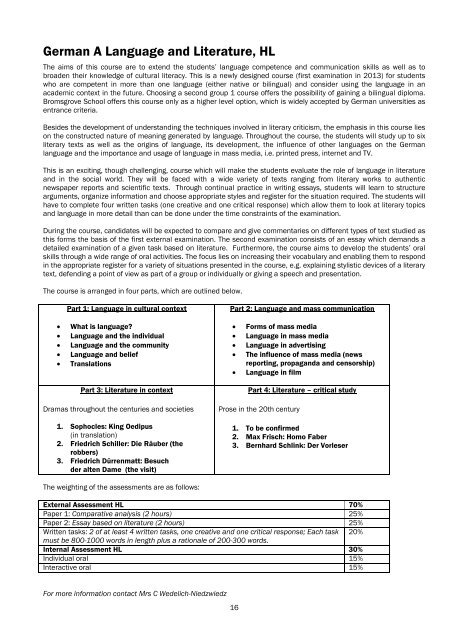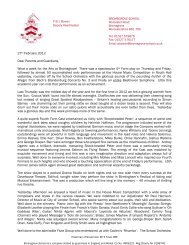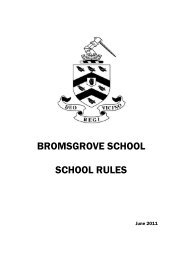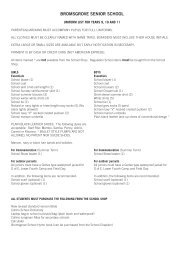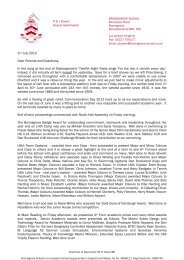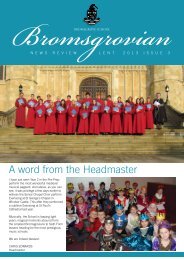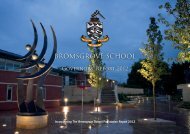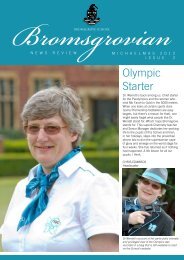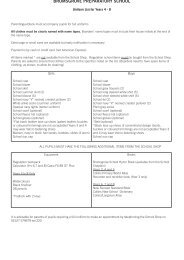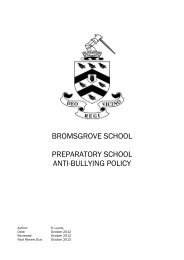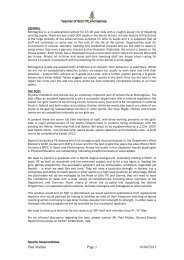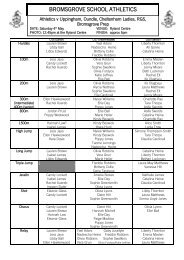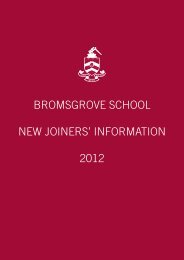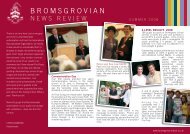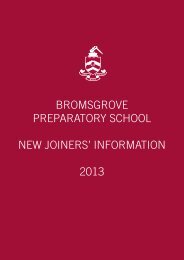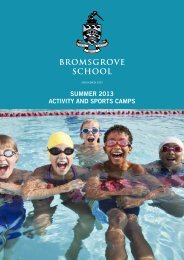Sixth Form Course Booklet 2013 - Bromsgrove School
Sixth Form Course Booklet 2013 - Bromsgrove School
Sixth Form Course Booklet 2013 - Bromsgrove School
Create successful ePaper yourself
Turn your PDF publications into a flip-book with our unique Google optimized e-Paper software.
German A Language and Literature, HL<br />
The aims of this course are to extend the students’ language competence and communication skills as well as to<br />
broaden their knowledge of cultural literacy. This is a newly designed course (first examination in <strong>2013</strong>) for students<br />
who are competent in more than one language (either native or bilingual) and consider using the language in an<br />
academic context in the future. Choosing a second group 1 course offers the possibility of gaining a bilingual diploma.<br />
<strong>Bromsgrove</strong> <strong>School</strong> offers this course only as a higher level option, which is widely accepted by German universities as<br />
entrance criteria.<br />
Besides the development of understanding the techniques involved in literary criticism, the emphasis in this course lies<br />
on the constructed nature of meaning generated by language. Throughout the course, the students will study up to six<br />
literary texts as well as the origins of language, its development, the influence of other languages on the German<br />
language and the importance and usage of language in mass media, i.e. printed press, internet and TV.<br />
This is an exciting, though challenging, course which will make the students evaluate the role of language in literature<br />
and in the social world. They will be faced with a wide variety of texts ranging from literary works to authentic<br />
newspaper reports and scientific texts. Through continual practice in writing essays, students will learn to structure<br />
arguments, organize information and choose appropriate styles and register for the situation required. The students will<br />
have to complete four written tasks (one creative and one critical response) which allow them to look at literary topics<br />
and language in more detail than can be done under the time constraints of the examination.<br />
During the course, candidates will be expected to compare and give commentaries on different types of text studied as<br />
this forms the basis of the first external examination. The second examination consists of an essay which demands a<br />
detailed examination of a given task based on literature. Furthermore, the course aims to develop the students’ oral<br />
skills through a wide range of oral activities. The focus lies on increasing their vocabulary and enabling them to respond<br />
in the appropriate register for a variety of situations presented in the course, e.g. explaining stylistic devices of a literary<br />
text, defending a point of view as part of a group or individually or giving a speech and presentation.<br />
The course is arranged in four parts, which are outlined below.<br />
Part 1: Language in cultural context<br />
Part 2: Language and mass communication<br />
<br />
<br />
<br />
<br />
<br />
What is language?<br />
Language and the individual<br />
Language and the community<br />
Language and belief<br />
Translations<br />
<br />
<br />
<br />
<br />
<br />
<strong>Form</strong>s of mass media<br />
Language in mass media<br />
Language in advertising<br />
The influence of mass media (news<br />
reporting, propaganda and censorship)<br />
Language in film<br />
Part 3: Literature in context<br />
Part 4: Literature – critical study<br />
Dramas throughout the centuries and societies<br />
1. Sophocles: King Oedipus<br />
(in translation)<br />
2. Friedrich Schiller: Die Räuber (the<br />
robbers)<br />
3. Friedrich Dürrenmatt: Besuch<br />
der alten Dame (the visit)<br />
Prose in the 20th century<br />
1. To be confirmed<br />
2. Max Frisch: Homo Faber<br />
3. Bernhard Schlink: Der Vorleser<br />
The weighting of the assessments are as follows:<br />
External Assessment HL 70%<br />
Paper 1: Comparative analysis (2 hours) 25%<br />
Paper 2: Essay based on literature (2 hours) 25%<br />
Written tasks: 2 of at least 4 written tasks, one creative and one critical response; Each task 20%<br />
must be 800-1000 words in length plus a rationale of 200-300 words.<br />
Internal Assessment HL 30%<br />
Individual oral 15%<br />
Interactive oral 15%<br />
For more information contact Mrs C Wedelich-Niedzwiedz<br />
16


